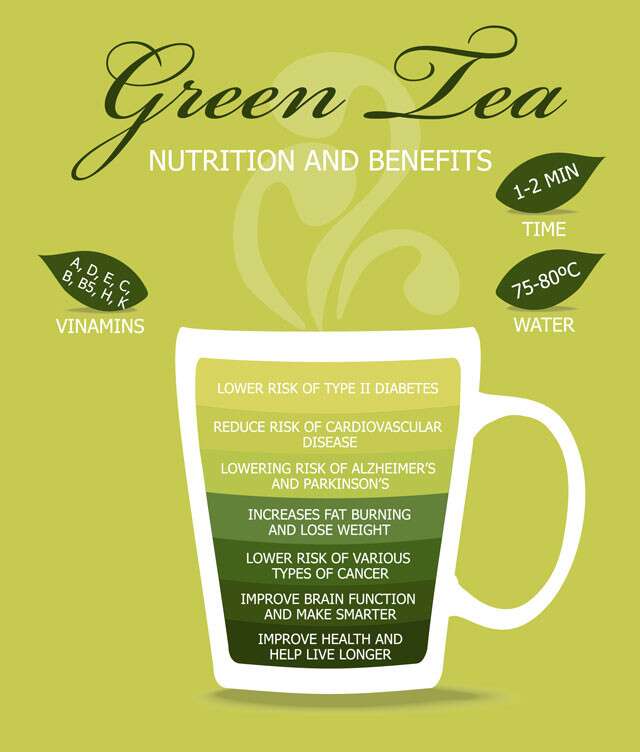Discover how drinking green tea can aid in weight loss and improve overall well-being. Green tea contains compounds that boost metabolism, increase fat oxidation, and offer protective effects against chronic diseases. Learn about the science behind green tea’s impact on weight loss, its role in thermogenesis, and its potential for appetite suppression. Find out how green tea can regulate blood sugar levels, enhance lipid metabolism, and improve exercise performance. Incorporating green tea into your daily routine may be a simple and effective way to achieve your weight loss goals.
Green tea has gained popularity as a natural remedy for weight loss and its numerous health benefits. In this article, we explore the potential of green tea in aiding weight loss and improving overall well-being. Scientific studies have shown that green tea contains compounds that can boost metabolism and increase fat oxidation. Additionally, green tea’s high concentration of antioxidants offers protective effects against various chronic diseases. Whether you’re looking to shed a few pounds or improve your overall health, incorporating green tea into your daily routine may be a simple and effective way to achieve your goals.
How Drinking Green Tea Can Aid in Weight Loss
The Science Behind Green Tea and Weight Loss
Green tea has been consumed for centuries and is known for its numerous health benefits. In recent years, it has gained popularity as a potential aid in weight loss. The question arises – how does green tea help in shedding those extra pounds?
One of the key components in green tea that contributes to weight loss is its high concentration of polyphenols, specifically catechins. Catechins are antioxidants that have been found to have a positive impact on metabolism and fat oxidation. These compounds can increase the body’s ability to burn fat and improve overall weight management.
Effect of Green Tea on Metabolism
Metabolism plays a vital role in the body’s ability to burn calories and maintain a healthy weight. Research has suggested that green tea can help boost metabolism and enhance fat oxidation. A study published in the American Journal of Clinical Nutrition found that consuming green tea extract significantly increased fat oxidation during moderate-intensity exercise. This suggests that incorporating green tea into your daily routine may enhance your body’s ability to burn calories efficiently.

Green Tea as a Fat Burner
Green tea extract has gained attention as a potential fat burner. The catechins present in green tea are believed to stimulate the body’s fat-burning process, known as thermogenesis. Thermogenesis is the production of heat in the body, which in turn increases calorie expenditure. By promoting thermogenesis, green tea may help individuals burn more calories and ultimately support weight loss efforts.
Role of Caffeine in Green Tea
Caffeine is a natural stimulant found in green tea and is known to have various effects on the body. When consumed in moderation, caffeine can help increase energy levels, focus, and alertness. It may also have a thermogenic effect, contributing to increased calorie expenditure. However, it is essential to note that excessive consumption of caffeine can lead to adverse effects such as jitteriness, anxiety, and sleep disturbances. It is best to consume green tea in moderation and be mindful of your caffeine intake if you are sensitive to its effects.

Green Tea and Thermogenesis
Thermogenesis, as mentioned earlier, plays a key role in weight loss. Green tea has been found to stimulate thermogenesis through the action of catechins and caffeine. A study published in the International Journal of Obesity demonstrated that green tea extract supplementation resulted in a significant increase in fat oxidation and thermogenesis compared to a placebo. This finding indicates that incorporating green tea into your diet may provide a natural boost to your metabolism and aid in weight loss.
Boosting Energy Expenditure with Green Tea
In addition to its potential thermogenic effects, green tea has been shown to increase energy expenditure. Energy expenditure refers to the number of calories burned by the body throughout the day, including during physical activity and at rest. A study published in The American Journal of Clinical Nutrition found that green tea extract increased energy expenditure and fat oxidation during both exercise and rest. This suggests that incorporating green tea into your routine may promote greater calorie burn throughout the day, supporting weight loss efforts.
Green Tea and Appetite Suppression
One of the challenges in weight loss is managing appetite and food cravings. Green tea may offer some assistance in this area as well. Research has suggested that green tea can help suppress appetite, thus reducing the desire to overeat. A study published in the journal Psychopharmacology found that green tea extract reduced hunger and increased satiety after a meal. By promoting feelings of fullness, green tea may contribute to consuming fewer calories overall, making it a valuable tool for weight management.
Regulating Blood Sugar Levels with Green Tea
Balancing blood sugar levels is crucial for overall health and weight management. Fluctuations in blood sugar can lead to increased hunger, cravings, and overeating. Green tea has shown the potential to regulate blood sugar levels. A study published in the Annals of Nutrition and Metabolism found that green tea consumption improved insulin sensitivity and reduced blood sugar levels. By promoting stable blood sugar levels, green tea may help control appetite and prevent spikes in cravings, making it an ideal addition to a weight loss plan.

Green Tea and Lipid Metabolism
Lipid metabolism refers to the body’s processing of fats, including the breakdown and utilization of stored fat. Green tea has been found to have a positive impact on lipid metabolism. Research suggests that the catechins in green tea can inhibit the activity of certain enzymes involved in fat synthesis, leading to a decrease in fat accumulation. Additionally, green tea has been shown to increase the oxidation of fatty acids, making stored fat more accessible for energy production. By supporting lipid metabolism, green tea may contribute to weight loss and body fat reduction.
Green Tea and Exercise Performance
Exercise is a crucial component of any weight loss program. Green tea has been studied for its potential role in enhancing exercise performance. The caffeine present in green tea has stimulating effects on the central nervous system, which can increase endurance and improve exercise capacity. Additionally, the antioxidant properties of green tea may help reduce exercise-induced oxidative stress, allowing for faster recovery and better overall performance. Including green tea as part of your pre-workout routine may provide an energy boost and support better exercise outcomes.
In conclusion, green tea offers numerous potential benefits for weight loss. Its high concentration of catechins, along with the presence of caffeine, contribute to its ability to boost metabolism, increase fat oxidation, suppress appetite, regulate blood sugar levels, and support lipid metabolism. Additionally, green tea may enhance exercise performance and overall energy expenditure. While green tea can be a valuable addition to a weight loss plan, it is important to remember that it is not a magic solution. It should be incorporated into a balanced diet and exercise routine for optimal results. As always, it is advisable to consult with a healthcare professional before making any significant changes to your lifestyle.
